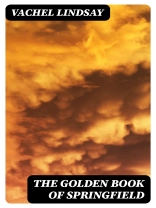Vachel Lindsay’s ‘The Golden Book of Springfield’ is a vibrant and lyrical exploration of the author’s hometown, enveloped in a modernist style that interweaves personal narrative with rich historical detail. The book serves as both a homage and a critical reflection on the cultural significance of Springfield, Illinois, chronicling its evolution through a series of imaginative poetic sequences. Lindsay employs diverse forms—ranging from free verse to traditional sonnets—demonstrating his mastery of language and rhythm while inviting readers to experience the city’s landscapes and inhabitants through his unique aesthetic lens. Vachel Lindsay (1879-1931) was an American poet and a central figure of the early 20th-century literary scene, known for his rhythmic and musical poetic style. His deep attachment to Springfield is rooted in his formative years, which informed both his artistic vision and his commentary on American society. Lindsay’s fascination with folk traditions, as well as his quest for a national identity within poetry, significantly influenced the vibrant character of this anthology, making Springfield a metaphor for broader American themes. ‘The Golden Book of Springfield’ is highly recommended for readers who appreciate a fusion of local history and personal reflection, as well as those interested in early modernist literature. Lindsay’s work not only celebrates Springfield but also invites contemplation on the relationship between place and identity, making it essential for anyone eager to delve into the richness of American cultural narratives.
Giới thiệu về tác giả
Nicholas Vachel Lindsay, known as Vachel Lindsay, was an American poet who is considered a founder of modern singing poetry. Born on November 10, 1879, in Springfield, Illinois, Lindsay was passionate about art and literature from a young age. Embracing the idea of the poet as a public voice, he often integrated performative elements into his readings, including chanting and singing, which set him apart from his contemporaries. Lindsay’s writing is often characterized by its rhythmic vitality and its lyrical engagement with social and political themes relevant to the early 20th century American experience.
Lindsay’s body of work includes several volumes of poetry, among which ‘The Golden Book of Springfield’ (1920) is quintessential, encapsulating his prophetic vision and apocalyptic optimism centered on his hometown of Springfield, Illinois. It is a utopian fantasy that reflects his idealistic hopes for a reborn American society. His poetic style combines a unique blend of American folklore, history, and fervent religiousness, incorporating both local color and the broader American identity. Although his reputation has waxed and waned in critical circles over the years, Lindsay’s influence on the development of American poetry and performance art remains undeniable. He died on December 5, 1931, but left a legacy of work that continues to be studied for its innovative blend of sound and social commentary.












